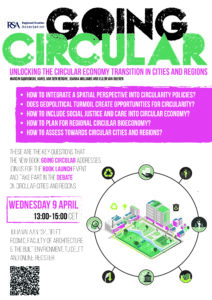Going Circular, a new book edited by Marcin Dąbrowski, Karel van den Berghe, Jo Williams, and Ellen van Bueren, dives into how the circular economy can drive this transformation. Drawing on contributions from leading researchers and practitioners, the book calls for integrating circularity into spatial planning policies. In this blog, we’ll highlight some key insights and themes from the book, part of the RSA’s Policy Impact Book Series. It’s a must-read for urban and regional scholars as well as policymakers.
Circular Economy and Regional Studies
The circular economy has been gaining momentum within the Regional Studies Association, reflected in a growing number of articles, conference sessions, and other contributions on the topic. Cities and regions are central to advancing circular economy transitions, as these transitions rely heavily on the interaction between materials, energy, and social systems within specific places. This aligns with the focus of the RSA community on place-based policies, governance, and development. The book adds to these debates, examining how urban and regional authorities can foster the circular economy and offering practical policy advice. We provide an overview of the key messages from each of the book’s six chapters below.
Toward a Spatial Perspective on the Circular Economy
For the circular economy to thrive, it must fit the specific spatial contexts of cities and regions. This means leveraging local resources, infrastructure, and community strengths while addressing spatial limitations and pressures. However, many circular economy policies overlook this spatial aspect.
As the book’s editors argue, a more holistic and relational approach is needed. Policies should go beyond technical fixes like resource efficiency and waste management. Instead, they should integrate principles of regeneration, resilience, and justice, recognizing the social and political dimensions of sustainability.

The Geopolitical Window of Opportunity
Geopolitical instability, such as the war in Ukraine, has underscored the urgency of localizing production and consumption systems. Resource and energy pressures in Europe highlight the need to enhance resilience and self-sufficiency. In Chapter 2, Karel van den Berghe and Marcin Dąbrowski discuss how crises like these offer opportunities to rethink resource use through a spatial lens. Local circular strategies can reduce dependencies, foster resilience, and mitigate spatial conflicts, though implementing these strategies is no easy task.

Care-Full Circular Economy
The circular economy must prioritize social justice and inclusivity alongside ecological goals. Chapter 3, by Federica Bono, Wendy Wuyts, and Elmar Willems, advocates for a “care-full” approach that integrates care and equity into circular economy frameworks. This means fostering sustainable and just development that addresses the needs of marginalized communities and reduces socio-spatial disparities. As the authors explain, “a care-full circular economy implies caring for carers, materials, space, time, and difference.” By embedding these principles into circular economy projects and policies, cities and regions can become more ecologically sustainable and socially just.

Circular Bioeconomy in Metropolitan Regions
Chapter 4, by Joanna Williams, highlights the importance of urban circular bioeconomies in reducing ecological footprints and securing resources. Cities must connect with their surrounding ecosystems, promoting local resource production and regeneration. Current policies often focus narrowly on recycling and reuse, neglecting broader ecological needs. Policymakers must recognize the critical link between urban areas and their hinterlands, ensuring that cities not only consume resources but also contribute to their regeneration.

Tools for Assessing Circular Economy Transitions
Ambitious circular economy policies often clash with the messy realities of implementation. Robust monitoring tools and data are essential to bridge this gap. Chapter 5, by Marcin Dąbrowski and Alexander Wandl, calls for comprehensive metrics to evaluate circular transitions. These tools should measure social, spatial, and ecological impacts, aligning with broader sustainability goals and providing actionable insights for policymakers.

Policy Lessons
The book’s final chapter emphasizes a place-based approach to circular economy policies. It urges policymakers to move beyond technical fixes and incorporate regeneration, resilience, and justice into strategies. This requires collaboration across all levels of government to promote spatially sensitive circularity.

Why Read Going Circular?
This book arrives at a critical moment as the urgency to address the climate crisis and resource overconsumption grows. While the circular economy has become a popular concept, many current approaches fail to realize its full potential for environmental and social regeneration. Moreover, applying the concept without considering spatial dynamics risks undermining the transition to a sustainable future. Going Circular fills a crucial gap by emphasizing the integration of circularity within spatial planning and place-based strategies. It bridges theory and practice, offering valuable insights for advancing the circular economy at local and regional levels. Intrigued? You can get the book here. Also, join us in Delft and online for the book launch event on 9th April 2025. Details are shared in the poster below.

Acknowledgment: Going Circular book was written as part of the RSA Policy Expo grant and published by Routledge via the RSA Policy Impact Book Series.
Authors

Marcin Dąbrowski teaches and researches spatial planning and (multi-level) governance issues related to sustainable urban and regional futures. He is based at the Department of Urbanism, Delft University of Technology. With a background in political science and experience in research on spatial planning systems, diverse territorial policies, and participatory practices, Marcin operates as a boundary spanner, creating bridges across disciplines, academic ‘tribes,’ and societal groups. Marcin has published extensively on the Europeanisation of regional and urban policies, the governance of the European Union’s Cohesion policy, and policy transfer. His more recent work explores questions of governance, policy learning, and citizen participation in the context of sustainability transitions in cities and regions. This includes topics such as integration of flood risk management with spatial planning, stakeholder engagement in water-linked heritage valorization (Interreg WaVE), the socio-spatial dimensions of circular economy (H2020 REPAiR project), participatory carbon-neutrality experimentation in cities (HE UP2030 project), cross-fertilization between EU Cohesion Policy and spatial planning across diverse European contexts (ESPON COMPASS), and engagement of marginalized communities in just sustainability transitions in regions that are heavily dependent on energy-intensive industries (HE DUST project). Marcin is a member of the board of the Regional Studies Association, with the territorial networks portfolio. m.m.dabrowski@tudelft.nl
![]() : marcin-dąbrowski
: marcin-dąbrowski ![]() : 0000-0001-6775-0664
: 0000-0001-6775-0664

Karel van den Berghe is an Assistant Professor in Spatial Planning and Urban Development Management at the Department of Management in the Built Environment, Delft University of Technology, The Netherlands. He holds a master’s in Geography and a master’s in Spatial Planning and Urbanism. His PhD focussed on the relational port city interface, exploring how a socioeconomic planning of urban and maritime systems should coop with ongoing transitions. More recently, Karel focusses on the question of the role of space in the circular economy (Circular Campus project), the increasing geopolitical turmoil due to re-/de-globalisation (NWO KIC SUBLIME project and NTNU 1-2-Tre-Steg project), the use of scenario methodology for uncertain spatial planning (South-Holland urban water bound industrial areas project), and the importance of industrial functions in or nearby urban knowledge areas as an answer first to localizing global production networks and second to beautiful and inclusive urban planning (HE FABRIX project). Karel is a member of the steering committee of the TUDelft Faculty of Architecture and Built Environment Circular Built Environment Hub, an advisor for the Dutch Council for Infrastructure and Environment, and a member of the advisory board of the Dutch Knowledge Alliance Industrial and Business Areas. He often gives advice to port authorities, municipalities, provinces, the Dutch and Flemish governments, and the European Commission. Karel is a Regional Studies Association Fellow 2023 (FeRSA). K.B.J.VandenBerghe@TUDelft.nl